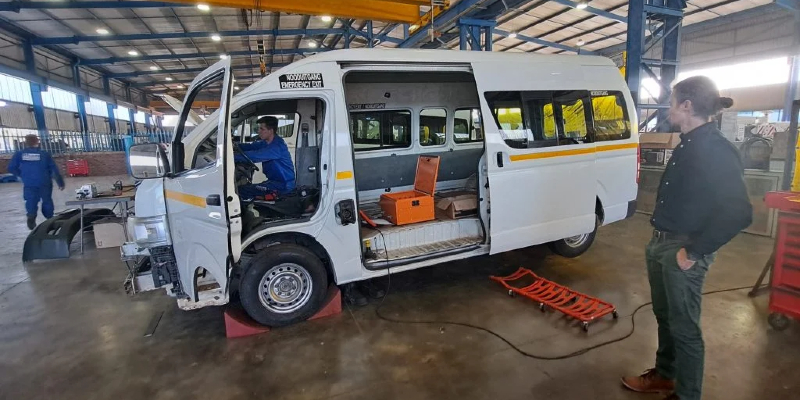South Africa (SA) has unveiled its first electric taxi amidst an ongoing electricity crisis.
According to reports by TechNext, a team from Stellenbosch University (SU) has partnered with Rham Equipment to test the country’s inaugural electric taxis.
“These electric taxis boast a range of up to 120 kilometres before requiring a recharge. Equipped with a 90 kWh electric motor and a battery capacity of 53.76 kWh, they signify a significant step towards sustainable transportation,” TechNext reported.
The collaborative effort from SU and Rham Equipment involved the conversion of a minibus taxi into an electric-powered vehicle.
Currently, in the road testing phase, performance assessments are scheduled to follow.
“The conversion process, as described by team member Stephan Lacock, involved removing the original internal combustion engine (ICE) along with related components like the petrol tank, manual transmission, gas pipe, and radiator.”
Collaborating with Rham Equipment, the team developed a replicable kit comprising key electric powertrain components: an electric motor, inverter, charger, electronic control unit, and a single-speed reduction gearbox.
Notably, the taxi also features regenerative braking, enhancing its range through energy recapture during deceleration.
This endeavour marks South Africa’s stride toward adopting cleaner mobility solutions.
Professor Thinus Booyesen from SU’s Industrial Engineering Department emphasized the importance of local electric vehicle production to avoid job losses and maintain industry relevance.
He stressed the need for both the automotive sector and the government to proactively drive this transition.
Professor Booyesen highlighted that more than 70% of trips in South Africa involve minibuses in the informal sector.
“By retrofitting around 250,000 existing minibuses with electric propulsion, the initiative aims to offer affordable and environmentally friendly options compared to new electric vehicles. This effort also seeks to raise awareness about assembling electric vehicles locally and promoting their positive environmental impact.”
Addressing the energy crisis, Johan Giliomee, a member of the group, suggested that electric taxis could be powered using solar energy, employing solar panels and battery energy storage systems. Hydrogen was also mentioned as a potential alternative.
In Nigeria, recent steps towards clean transportation include the acquisition of electric and compressed natural gas (CNG) buses.
While the focus is on reducing transport costs and carbon emissions, the success of these initiatives relies on strategic execution.
Amidst South Africa’s ongoing energy challenges, the introduction of electric taxis signifies a determined move toward sustainability, even in the face of hurdles.




